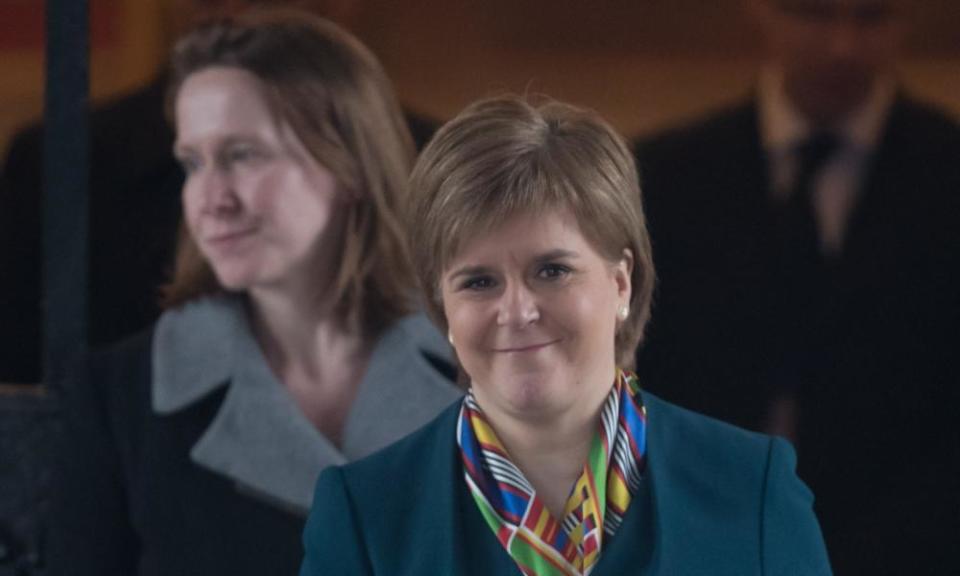Ministers warned of constitutional crisis risk over EU withdrawal bill

Ministers have been warned they must amend the EU withdrawal bill to curtail any possibility of a power grab away from the Scottish and Welsh devolved administrations or risk a constitutional crisis.
The first secretary of state, Damian Green, is to meet senior figures in the Welsh assembly and Scottish government on Monday at the joint ministerial committee. They will warn that the devolved administrations will not give legislative consent unless the bill is significantly amended.
The first minister of Wales, Carwyn Jones, said he would recommend the Welsh assembly block the bill unless changes were made.
“We do not accept the bill in its current form and have recommended that the assembly does not grant its consent unless changes are made,” he said. The SNP’s Brexit minister, Mike Russell, has also previously told the Scottish parliament there was no consent for the bill in its current form.
The Scottish and Welsh administrations have demanded additional changes to avoid what they describe as a Westminster power grab on devolved policy areas including fisheries and agriculture.
In the bill, powers derived from EU law in those areas would be retained by Westminster, with central government deciding whether to devolve them at a later date.
A senior UK government source said Green hoped to agree a statement of principles with the devolved administrations at the meeting on Monday, committing to returning powers to Belfast, Edinburgh and Cardiff.
A significant proportion of the agenda for the meeting has been dedicated to discussing amendments to the bill and concerns about its impact on devolution. Northern Ireland will be represented by its head of the civil service, David Sterling, given the failure of Stormont parties to agree a power-sharing deal.
The source said it was crucial the new powers did not jeopardise the the UK’s internal single market, meaning guidelines would have to be agreed before new EU-derived powers could be devolved. “This government is on board with devolution, it’s not in our interests to pursue a power grab,” the source said.
Any failure to reach agreement could spark a constitutional crisis if the devolved administrations then refuse to give their consent to the bill. “Everyone wants to avoid that,” a source said.
Jones hinted he had been given the nod that changes were being made after meeting Green, Theresa May’s de facto deputy, last week. “Clearly there is little expectation that the bill will survive in its current form as it passes through parliament, and we remain hopeful that the UK government will come to support the required changes,” he said.
Welsh Labour, SNP and Plaid Cymru MPs have submitted detailed amendments on devolution in consultation with the devolved administrations.
Russell said he believed agreement was possible: “I hope progress can be made on a number of fronts, for example, on recognising the importance of single market membership and amending the EU withdrawal bill so the Scottish parliament can give it consent.
“On the EU withdrawal bill, progress can made if the amendments suggested by the Scottish and Welsh governments are accepted.”
In a statement, Green said he was “committed to delivering a significant increase in the decision-making power of each devolved administration after we leave the European Union”. Wales’s finance secretary, Mark Drakeford, who will attend Monday’s talks, is to call for a “reset relationship with the devolved administrations”.
Jones also gave a stark warning on the prospect of a “no deal” Brexit in which the UK crashed out of the EU without a negotiated settlement, saying it would be grounds for an immediate general election.
“The growing view on the Conservative benches that no deal is a viable outcome is a deeply dangerous fallacy. Walking away from the talks would be a catastrophic political failure with dire economic and security consequences.
“In fact, it would be such a seismic event it would provoke a massive political crisis, which ought to lead to an immediate general election so the electorate could clearly express their view via the ballot box.”
Jones said a trade deal with Europe had to take precedence over any other. “It is one of the world’s biggest markets – bigger than America – it is on our doorstep, we share a land border. If we can’t do a deal with them, we have no chance of doing a deal with anybody else,” he said.

 Yahoo News
Yahoo News 